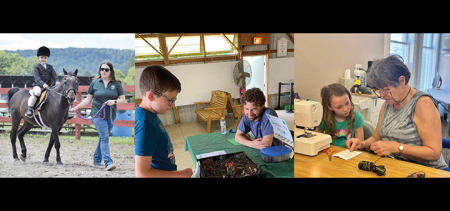Following The Trail Of Government Is A Road Less Traveled
Published:
March 12th, 2007
By:
Michael McGuire

NORTH NORWICH – Loretta L. Smith has been the North Norwich Town Clerk for 27 years, and hasn’t received a Freedom of Information Law request for any of the town’s records in nearly 15.
“It’s been a long time,” Smith said.
North Norwich residents aren’t the only ones in Chenango County foregoing their legal right to information.
Nationally, from the Watergate era through to the digital age, FOIL has sought – and adapted – to empower citizens with the right to know what their elected and appointed officials are up to. With room for interpretation, the law allows for public access to government (public) records – for any reason – with the intent that people will improve their lives by better understanding what’s going on in their community, state, or country.
“There are a million situations where people need government records to improve their lives,” said Robert Freeman, the executive director of the New York State Committee on Open Government. “Any number of possibilities exist.”
Freeman said people use FOIL everyday on a range of subjects, from discovering how schools choose bus stop locations to trailing political campaign contributions.
As a result of a recent freedom of information inquiry, the City of Norwich disclosed to The Evening Sun that it has spent $83,754 in legal fees on a lawsuit regarding year-round residents at Chenango Lake and the protection of its water quality.
Locally however, FOIL requests are a tool people rarely use or just don’t need, public records officials confirmed.
Of the 31 local municipalities and county departments surveyed, 17 received zero FOIL requests from Jan. 1, 2006 to the present. Ten of the agencies got between one and five. Several haven’t had a single request in over a decade.
“When there’s less controversy, then there are less people concerned about what’s going on,” Smith said, acknowledging that most of North Norwich’s consistent open government activists are now deceased. “Younger people, the younger generations, just don’t get involved.”
Smith, like the other 25 town and village clerks who were interviewed, does contend that almost every piece of information the public does ask for – like budgets, meeting minutes, and tax records – is readily available, and doesn’t require a formal request (unless, in most cases, research and copies are required).
“I don’t get anything like that (FOIL),” said Jacqueline Rice, the Lincklaen Town Clerk. “They can just come in and look.”
Without using FOIL, Town of Norwich residents can view a two-inch thick folder of e-mails, letters, minutes, maps and plans related to the almost four-year-old Alteren resort proposal. Besides an Evening Sun reporter, none ever have, clerk Sharon Gohl-Muserallo said.
“We’ve had two people in the last three or four years,” said Gohl-Muserallo, in regards to FOIL requests.
The Town of Smithville led all townships (it’s only the 14th largest by population out of 21) with 15 FOIL requests in the last 14 months.
Most clerks say genealogy records and birth certificates are popular documents that people seek out most often. That information does require formal requests and fees, which are guided by state laws separate from FOIL.
The City of Norwich and County Treasurer’s Office both received roughly 17 FOIL’s since the beginning of 2006. County Treasurer William Evans said they are usually related to legal matters, and not initiated by the general public. City records officer Bill Roberts said the requests he processes are usually asking for police records.
According to New Berlin Town Clerk Mary Brown, FOIL or not, government records aren’t a popular public demand in general.
“No one requests anything,” said Brown. “So it (FOIL) is not an issue.”
Author: Michael McGuire - More From This Author
Comments






